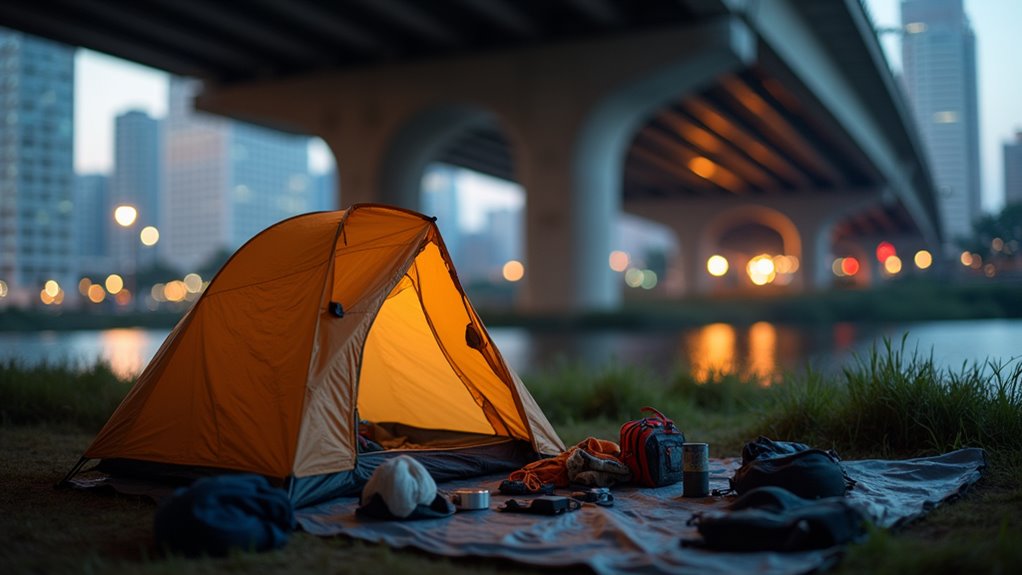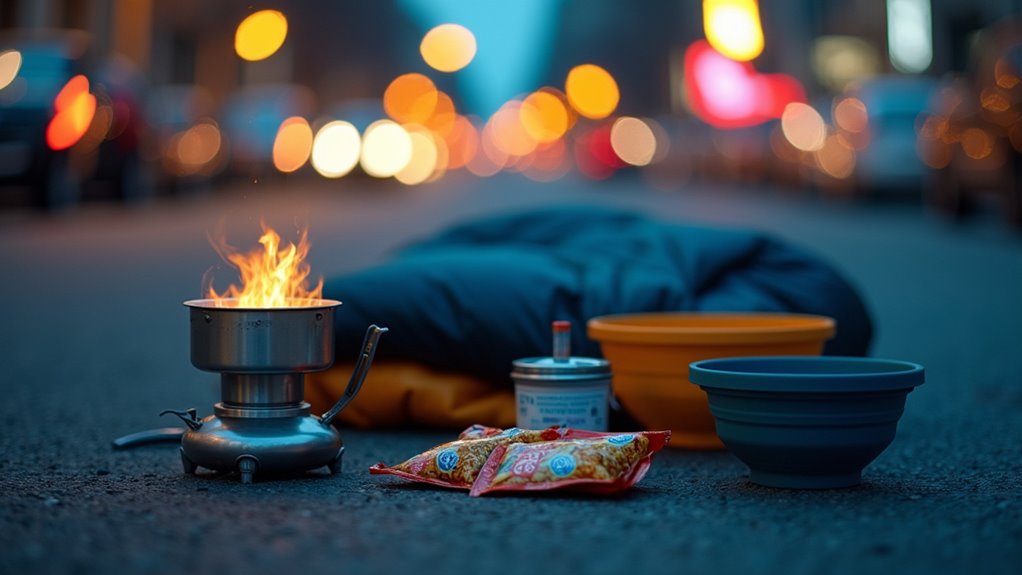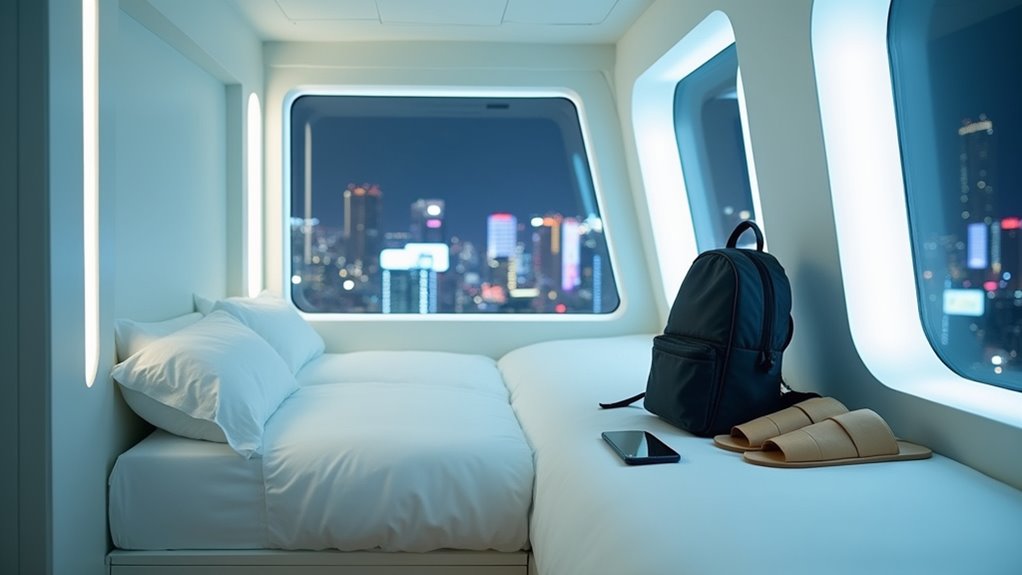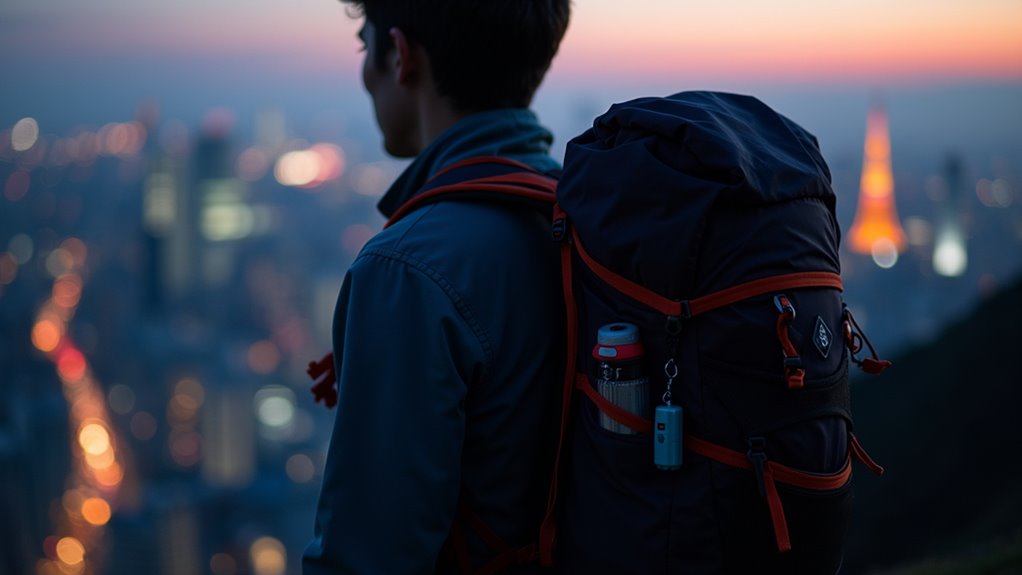Physical Address
304 North Cardinal St.
Dorchester Center, MA 02124
Physical Address
304 North Cardinal St.
Dorchester Center, MA 02124

Navigate Japan's urban camping maze with insider secrets that could save your budget trip—or land you in serious trouble.
With over 127 million people packed into Japan’s urban areas, you’d think finding a quiet spot to sleep outdoors would be impossible. Yet thousands of budget travelers successfully navigate Japan’s cities through strategic urban camping every year. You’ll need to understand the complex web of local laws, cultural expectations, and practical challenges that make camping in Japanese cities both risky and rewarding. The key lies in knowing exactly where you can—and absolutely cannot—set up for the night.

Before you pitch your tent in Tokyo’s parks or settle down for the night under Osaka’s bridges, you’ll need to understand that Japan takes a strict approach to urban camping. Wild camping is generally prohibited in public spaces, including parks, streets, and most outdoor areas within city limits.
Japan enforces strict regulations against urban camping, prohibiting wild camping in public spaces like parks and streets within city limits.
You can’t legally camp in train stations, convenience store parking lots, or temple grounds without permission. Police will politely but firmly ask you to move along if caught sleeping rough.
However, there are legal alternatives. Look for designated camping areas within city boundaries, capsule hotels for budget stays, or 24-hour internet cafes that allow overnight visits.
Some parks offer specific camping zones during certain seasons, but always check local regulations first and obtain proper permits when required.
For those seeking organized outdoor experiences, consider looking into summer camp ideas that operate within Japan’s legal framework and offer structured camping activities in approved locations.
While Japan’s urban camping laws seem restrictive, you’ll discover several legitimate options that won’t break your budget or land you in trouble with authorities. Start by checking municipal websites for designated camping areas within city limits – many cities offer free or low-cost spots.
24-hour internet cafes provide affordable overnight shelter for around ¥1,500-3,000.
Public bathhouses (sento) often allow extended stays and cost under ¥500.
Train stations with overnight service areas can work temporarily, but don’t overstay your welcome.
Parks aren’t technically legal for camping, but some tolerate discrete overnight stays if you’re respectful and leave no trace.
Always carry proper identification, keep noise levels down, and have backup accommodations ready if authorities ask you to move.
If you’re looking to combine urban camping with outdoor adventures, consider exploring some of the world’s best hikes located near major Japanese cities for day trips.

Once you’ve secured your urban camping spot, packing the right gear makes the difference between a comfortable night and a miserable experience. You’ll need a compact, lightweight sleeping bag rated for Japan’s seasonal temperatures. Skip bulky tents—invest in a quality bivy sack or ultralight tarp that won’t attract unwanted attention.
Pack layers for Japan’s unpredictable weather: moisture-wicking base layers, insulating mid-layers, and a waterproof outer shell. Don’t forget a small pillow or inflatable cushion for concrete surfaces.
Bring a portable phone charger, headlamp with red filter, and cash for convenience stores. A compact first-aid kit and water purification tablets are essential backups. Choose gear that’s multipurpose and fits in a standard backpack—you’ll blend in better while controlling Japan’s cities. Consider the renting versus buying decision for specialized equipment you might only use occasionally during your urban camping adventures.
Since Japan operates on deeply ingrained social principles of respect and harmony, you’ll need to adapt your camping behavior to align with local expectations.
Keep noise levels minimal, especially after 10 PM and before 6 AM.
Maintain quiet hours from 10 PM to 6 AM to respect fellow campers and nearby communities.
Japanese culture values cleanliness—pack out all trash and leave your campsite spotless.
Bow slightly when greeting locals and use “arigatou gozaimasu” (thank you) frequently.
Remove shoes when entering any building, including camp facilities.
Don’t point with your finger; use an open hand instead.
Avoid eating while walking, and if you’re camping near residential areas, cook discreetly to minimize food odors.
Respect photography boundaries—never photograph people without permission.
These small gestures cost nothing but earn tremendous goodwill from locals.
For outdoor enthusiasts seeking more adventurous activities during their stay, Japan offers incredible opportunities to explore natural landscapes beyond traditional camping sites.

Even experienced urban campers encounter situations where pitching a tent becomes impossible—whether due to weather restrictions, local regulations, or safety concerns. Japan offers several budget-friendly backup options that won’t break your travel fund.
Capsule hotels provide affordable overnight stays starting around ¥2,000-4,000, offering basic amenities and secure storage. Manga cafes (internet cafes) let you sleep in private booths for ¥1,500-3,000 per night, complete with unlimited drinks and comics. 24-hour saunas offer sleeping areas, baths, and relaxation spaces for similar prices.
Youth hostels remain excellent value, typically costing ¥2,500-4,500 nightly. Business hotels during weekdays often offer competitive rates. Don’t overlook temple stays (shukubo), which provide unique cultural experiences alongside budget accommodation.
Keep these contact numbers saved and research locations beforehand—you’ll thank yourself when plan A falls through. Consider purchasing travel insurance that covers accommodation emergencies, as it can reimburse unexpected lodging costs when your original camping plans are disrupted by unforeseen circumstances.
While urban camping saves money on accommodation, maintaining proper hygiene becomes your biggest daily challenge—especially when you’re carrying limited supplies and lack access to private facilities.
Public bathhouses (sento) offer affordable full showers for ¥400-500, while some convenience stores provide basic restroom facilities.
Pack compact hygiene essentials: biodegradable soap, quick-dry towel, wet wipes, and dry shampoo. Department store restrooms often have better facilities than street-level options.
Consider day-use packages at capsule hotels (¥1,000-2,000) when you need thorough cleaning.
Many train stations have coin-operated shower facilities. Gym day passes provide shower access plus exercise opportunities.
Keep a small mirror, toothbrush, and travel-sized toiletries easily accessible. Baby wipes work excellently for quick cleanups between proper washes, helping you maintain dignity while budget camping.
Creating your own DIY camping gear can help maximize limited luggage space while ensuring you have essential hygiene tools tailored to urban environments.

Though Japan ranks among the world’s safest countries, urban camping still requires careful planning and risk awareness. Download emergency apps like Yahoo Weather and Safety Tips for disaster alerts in multiple languages. Keep emergency contact numbers handy, including local police (110) and fire/ambulance (119).
Store your camping gear securely and avoid displaying expensive items. Choose well-lit, populated areas for setup, especially near convenience stores that stay open 24/7. Pack a basic first-aid kit with bandages, pain relievers, and any personal medications.
Natural disasters like earthquakes happen frequently in Japan. Identify nearby evacuation centers and keep a flashlight accessible. Register with your embassy if you’re traveling long-term. Most importantly, trust your instincts—if something feels unsafe, relocate immediately.
If you’re planning to combine urban camping with outdoor adventures, consider learning basic rock climbing techniques to safely explore Japan’s mountainous terrain near cities.
You’ve got the roadmap to urban camping in Japan without breaking the bank or the law. Remember, when in Rome, do as the Romans do—respect local customs, stay quiet, and leave no trace. Pack light but smart, research your spots beforehand, and always have backup accommodation options ready. With proper preparation and cultural awareness, you’ll navigate Japan’s cities safely while keeping your wallet happy. Stay flexible, stay respectful, and enjoy your budget-friendly adventure.